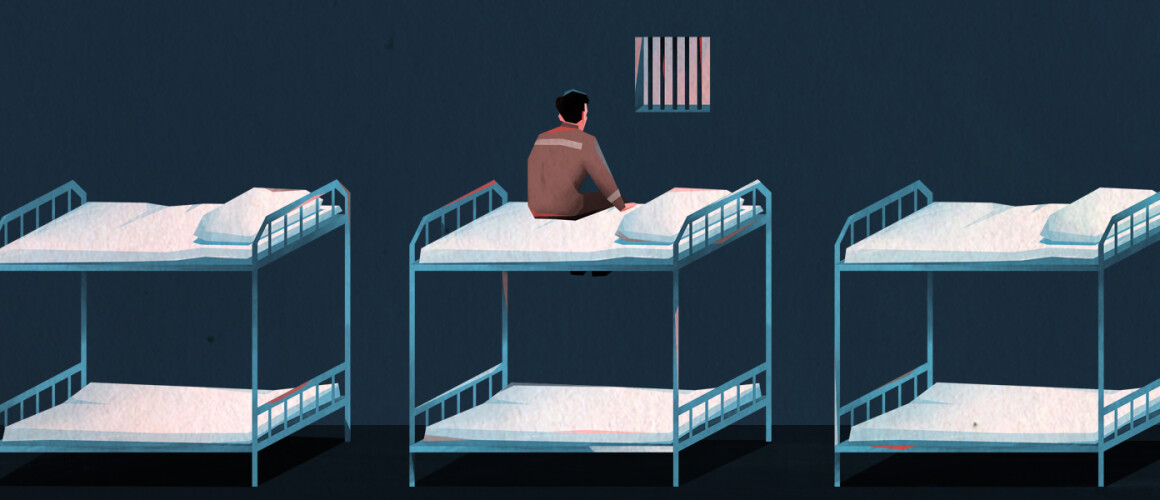Vladyslav Plakhotnyk is a political prisoner
A 19-year-old Ukrainian prisoner of war has been sentenced to 18 years’ imprisonment for serving in the Azov Brigade
The ‘Support for Political Prisoners. Memorial’ human rights project, in accordance with international standards, considers Vladyslav Plakhotnyk a political prisoner. Plakhotnyk has been convicted on charges of participation in the activities of a terrorist organisation and receiving training for terrorist activities. Plakhotnyk’s prosecution and conviction violated his right to fair trial, as well as the rights and freedoms guaranteed by the Geneva Convention on the Treatment of Prisoners of War. We demand that Vladyslav Plakhotnyk’s criminal prosecution be terminated and that the norms of international law be respected in his case.

What were the charges against Vladyslav Plakhotnyk?
Vladyslav Plakhotnyk, a 19-year-old Ukrainian citizen, served under contract in the Azov National Guard Brigade as a driver and medic. According to Plakhotnyk, he was mobilised in 2023 after dropping out of college. His job was to carry the wounded out of the combat zone. After three months of service, in December 2023 he was captured by the Russian military.
Vladyslav Plakhotnyk was charged with two criminal offences: participation in the activities of a terrorist organisation (Article 205.5, Part 2, of the Russian Criminal Code) and training in terrorism (Article 205.3). Vladyslav Plakhotnyk stated in court: ‘I recognise the factual circumstances mentioned in the case, but I do not admit to being a terrorist and never will. I fought for my country, for the independence and integrity of my state.’
On 3 May 2024, a court in Rostov-on-Don sentenced Plakhotnyk to 18 years in a strict-regime penal colony, with the first three years to be served in a cell-type prison.
Why do we consider Vladyslav Plakhotnyk a political prisoner?
The Azov Battalion is one of the units of the Ukrainian National Guard. We consider the decision of the Russian Supreme Court to designate this formation as a terrorist organisation unjustified and unlawful. Moreover, we consider this to be a decision made for the purposes of propaganda in the circumstances of the war unleashed by Russia against Ukraine. Any charges of ‘terrorist’ offences brought on the grounds of involvement in this military unit are therefore unlawful.
Vladyslav Plakhotnyk participated in the defence of Ukraine against Russian aggression as a member of an official military formation. Captured on the battlefield, he is consequently a prisoner of war. He has not been accused of committing any war crimes. He was trained in combat skills not to ‘carry out terrorist activities’ but to fulfil legitimate combat tasks. Such training was a necessary part of his military service and therefore constitutes no offence.
Vladyslav Plakhotnyk is the youngest Ukrainian prisoner of war known to us to be prosecuted on terrorism charges in violation of the Geneva Convention on the Treatment of Prisoners of War. According to the Convention, prisoners of war cannot be prosecuted for the mere fact of participation in hostilities. Such a prosecution can itself be considered a war crime.
A detailed description of Vladyslav Plakhotnyk’s case and of our position is available on our website.
Recognition of an individual as a political prisoner does not imply the ‘Political Prisoners. Memorial’ human rights project agrees with, or approves, their views, statements, or actions.
How can you help?
You can write to Vladyslav Plakhotnyk at the following address:
In Russian: 662606, Красноярский край, г. Минусинск, ул. Горького, д. 114, ФКУ Т ГУФСИН России по Красноярскому краю, Плахотнику Владиславу Сергеевичу 2005 г. р.
In English: Vladyslav Serhiyovych Plakhotnyk (born 2005), Prison, Federal Penitentiary Service of Russia for Krasnoyarsk Krai, 114 Gorkogo Street, Minusinsk, 662606, Russia.
You can also send an email via ZT (for payment with Russian bank cards), PrisonMail (for payment with other bank cards), OVD-Info and Memorial-France (free of charge).
Please note that letters in languages other than Russian are highly unlikely to reach the recipient.
You can donate to help all political prisoners in Russia.

